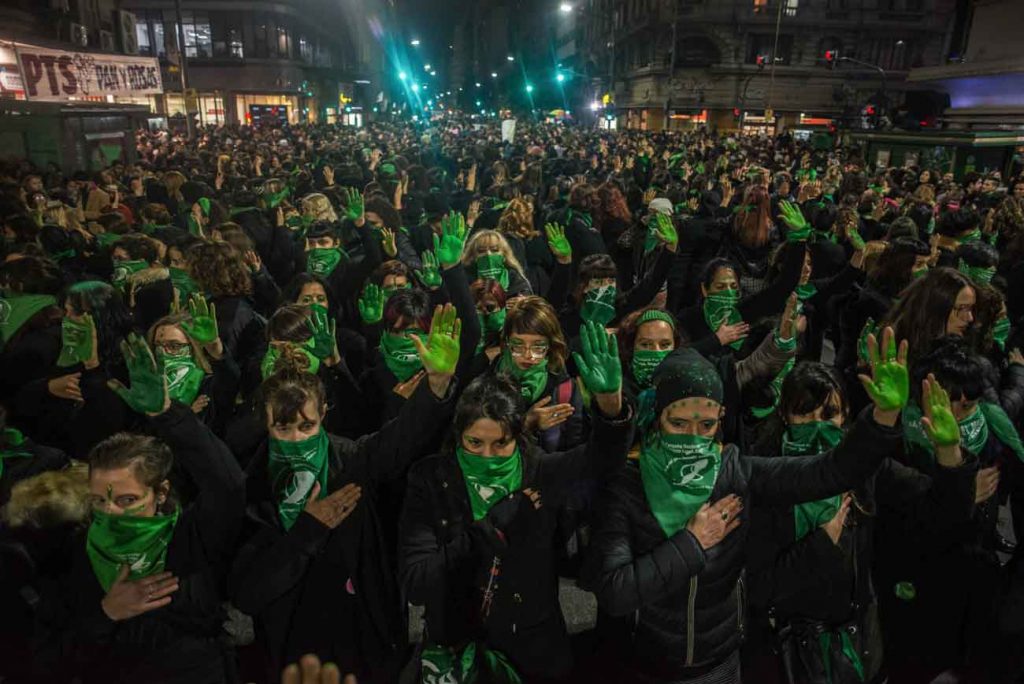During the past month, hundreds of thousands of people have taken to the streets of Argentina to fight for abortion rights. Hundreds of women die each year and thousands are hospitalized in Argentina because they lack access to safe, free and legal abortions.
Since the right-wing government opened the debate on the issue in the National Congress, there have been constant mobilizations. Green bandanas, symbolizing the demand for the right to abortion, have became a common sight.
On the night of June 13, abortion rights were debated in the Congress. Many people stayed in the street all night waiting to hear the results of the vote. On the morning of June 14, the historic vote for abortion rights passed to the thundering cheer of thousands. Having passed the Chamber of Deputies, the law will be voted on by the Senate in August.
Argentina votes on Abortion Legalization
Thousands mobilize and camp outside congress overnight in efforts to pass abortion legislation in Argentina.
Posted by Left Voice on Thursday, June 14, 2018
The only political force whose members of Congress unanimously support the right to abortion is the Left and Workers Front (Frente de Izquierda y los Trabajadores); the rest of the parties and coalitions are divided on the issue; this includes representatives from the party of ex-president Cristina Fernández de Kirchner, who herself spent years opposing abortion rights.
Left Voice interviewed three activists and political representatives from the Left and Workers Front who are also leading members of PTS, the Socialist Workers Party (Partido de los Trabajadores Socialistas). Myriam Bregman is a member of the Buenos Aires City Legislature. She is a human rights lawyer who prosecuted former leaders of the military dictatorship, and she is an outstanding leader in the women’s movement. Nathalia Seligra is a teacher, leader in her union, and an elected member of the National Congress. Andrea D’Atri, a specialist in gender issues, is the founder and leader of Pan y Rosas, the largest socialist-feminist organization in Latin America, as well as author of Pan y Rosas, a history of the feminist movement from a socialist perspective.
Left Voice: Andrea, the struggle to legalize abortion in Argentina has been going on for several decades, and the women’s movement in Argentina is one of the most powerful in the world, as we saw with the recent protests for legalization and, before that, with the “Ni una Menos” demonstrations. Can you tell us about your experience as part of the women’s movement and how you prepared for this important day?
Andrea D’Atri: The struggle to legalize abortion in our country has been going on for decades, but it gained momentum after the mass protests of 2001 that overthrew four presidents, when women became leaders in the unemployed workers’ movement, in recovered factories, and in neighborhood assemblies. At the National Women’s Conference held in 2003, an assembly for the legalization of abortion was organized, with the participation of hundreds of women, and thousands of us took to the streets to demand legalization. The National Campaign for the Legalization of Abortion was launched in 2005. This campaign is a heterogeneous federal coalition that includes more than 300 feminist groups, political organizations and public figures. Its founding slogan is “Sex education so we can decide, contraceptives to prevent abortions and legal abortion so we don’t die.” This coalition drafted a bill called the Voluntary Termination of Pregnancy that was submitted to Congress for the first time in 2007. The bill was not discussed and it lost its parliamentary status.
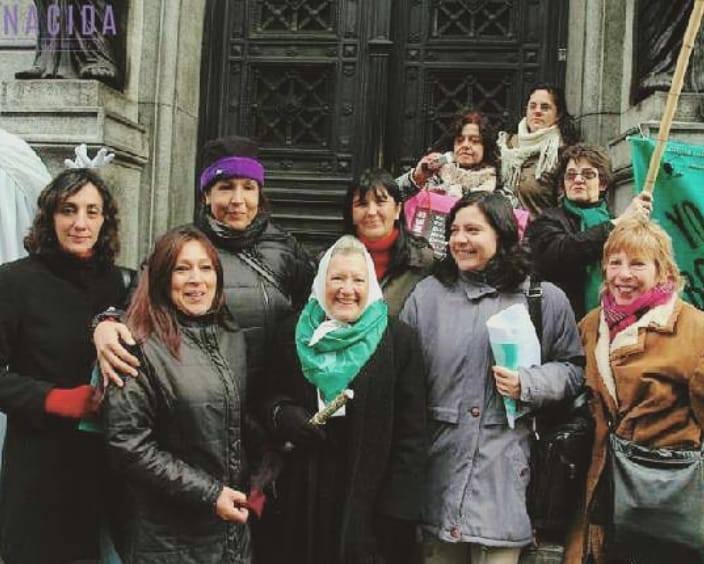
“We are hundreds of thousands today because, at one point, we were not afraid to be few.” Andrea D’Atri and other activists presenting the abortion rights bill in Congress.
It was resubmitted in 2009 and 2011, and, despite having the support of representatives in Congress in both cases, it was shelved and lost its parliamentary status again without having been discussed in any committee.
In November 2014, it was submitted again with the support of 70 representatives, but the ruling party (under Fernández de Kirchner’s administration) and the opposition parties joined forces to prevent it from getting through the lower chamber’s committee meeting, which was held to discuss the bill, and once again it lost its parliamentary status.
In 2016, it was submitted again. By then, the bill had been signed by more than 70 representatives. President Mauricio Macri stated that no bill for the termination of pregnancies would be promoted during his administration. “We have to defend life,” he said.
On March 6 of this year, it was submitted for the seventh time and was signed by 72 representatives from different parties. At the same time, demonstrations were held in support of the bill; they were called “pañuelazos” (scarf protests) because of the green scarves worn by protesters, which have become a symbol of the campaign to legalize abortion. After the huge demonstration on March 8 during the Women’s International Strike, people began debating the issue all over the country. Now no one can deny that women are a decisive factor in shaping politics when we take to the streets.
The huge women’s protests in Argentina have been gaining momentum since 2015, when hundreds of thousands of women flooded the streets in dozens of cities throughout the country under the slogan #NiUnaMenos which is used to protest femicides and all forms of violence against women.
This launched a powerful movement of young women in schools and universities and women of various ages in their workplaces, who took to the streets while discussing and organizing against the different forms of oppression that we experience every day.
The bill managed to get through the lower house because of the persistence and determination of the hundreds of thousands of people, mostly women, teenagers and girls, who have kept marching to Congress every day since noon on June 13.
LV: Andrea, on June 13 we saw the streets brimming with women; in particular, we saw thousands of very young women occupying schools and taking on leadership roles in the struggle. How do you explain this awakening of the youth? And what are the prospects for the women’s movement as a result of this awakening of the new generations?
Andrea D’Atri: Young women have been carrying out different actions to demand that Congress and the Senate endorse the right to free abortions.
The authorities and even the governors in some provinces have implemented measures in the schools to punish those who are participating in these actions, but this has always led to mass mobilizations in city squares, at workplaces, in public schools and also in some religious schools. These protests have been led by students, employees, actresses, health workers and teachers. The youngest among them have taken up leadership roles.
The women’s movement drafted a bill that the House of Representatives discussed more than a decade later, but it has managed to get through because of the mass “green tide” mobilizations.
The demand to legalize abortion reflects a very profound trend, comparable to the human tide of a million people that shook the country in July 2015 under the slogan “Ni Una Menos.” Those who are 13 years old now were only 10 at the time. They’re having their first political experiences, occupying schools, taking to the streets and demanding an end to the patriarchy.
In the Senate, legislators will see that these 12-, 13- and 14-year-old girls demanding legalization will not rest until the bill has been passed. “If the bill doesn’t pass, there’s going to be trouble,” say the girls. And they really feel emboldened now because they’ve made a lot of progress and the church has had to retreat.
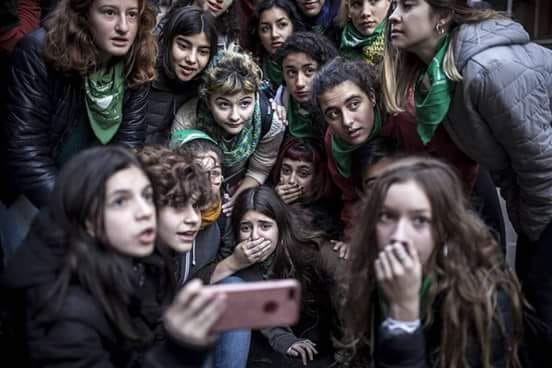
Girls wait outside Congress for the results of the abortion rights legislation.
We will continue to fight for the law to be passed in the Senate without amendments, but we also have to demand the separation of church and state. We have to get the state to stop entitlements, paying bishops’ salaries through subsidies, and as exemptions for their large estates; the church has many privileges, while austerity policies are implemented against the working people.
We in Pan y Rosas and the Left Front say to the women’s movement that we have to build alliances with the workers and strengthen the bond between the youth and the class that moves the levers of the economy. We believe that this is what we have to achieve now to wage future struggles from an anticapitalist and antipatriarchal perspective.
Work sites and schools can be the places where the green tide can turn the camaraderie that we achieved on the streets into organization, and this is important because either they prevail or we do. And in these battles for legal abortion, if we manage to defeat the government, the church, and the reactionary and obscurantist sectors of society, we will be taking a first step toward what is to come.
LV: Nathalia, it’s significant that in the past decade under the Kirchner administrations, abortion was not legalized and the issue wasn’t even discussed in the legislative chambers. How do you explain this, and what role did the country’s so-called progressivism play?
Nathalia Seligra: Under the Kirchner administrations, the government was never willing to address the bill that had been submitted several times since 2007 to the lower chamber by the National Campaign for the Legalization of Abortion. At the time, Fernández de Kirchner said society wasn’t prepared to address the issue. This demand was increasingly raised by the women’s movement, and it gained support among broad social sectors as we kept hearing about the harrowing numbers of deaths from illegal abortions in the country. It was under the Kirchner administration that Belén, a young woman from the province of Tucumán, was jailed for two years on charges of having had an abortion. Thanks to the struggle against her incarceration, she was ultimately freed and then acquitted.
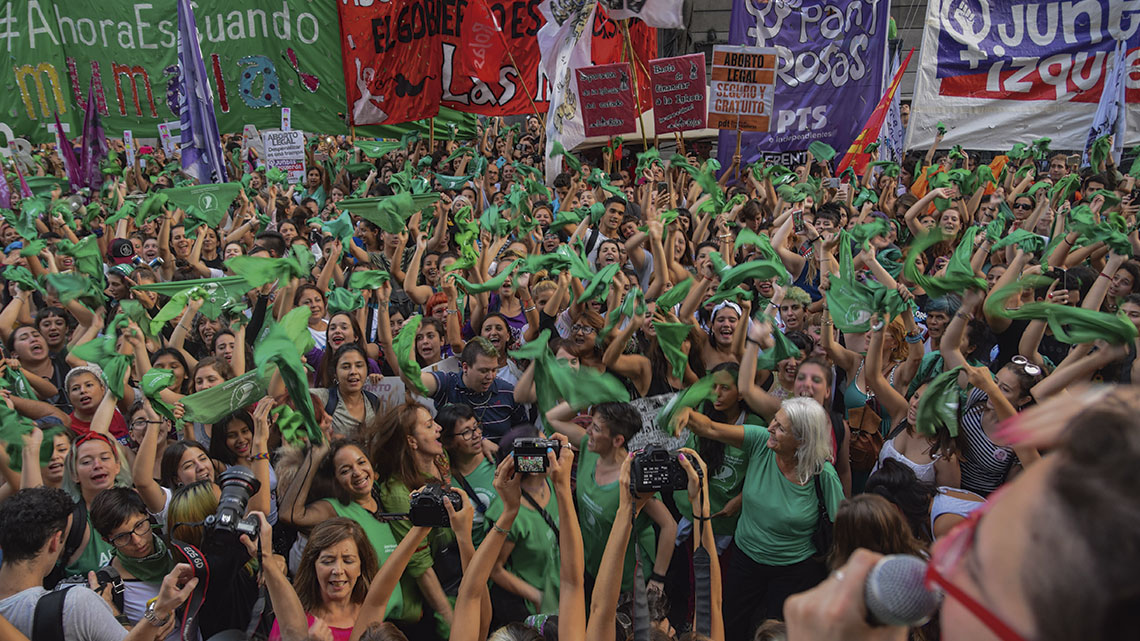
Fernández de Kirchner maintained a firm alliance with José Mario Bergoglio (former cardinal of the Argentine Catholic Church and now Pope Francis). So not only was abortion not legalized, but the amendment to Section 19 of the Civil Code that was passed at that time states, “The existence of a human person begins with conception.” So the women’s movement grew in opposition to the government and took a huge step forward in 2015 with protests against the brutal femicides that were occurring. Despite having passed a law against gender violence, the Kirchner administration didn’t invest a cent in elementary measures, such as shelters and subsidies, required to help women escape situations of domestic violence. The Kirchner administration used demagogic rhetoric and passed certain laws such as the law against gender violence and for marriage equality. But it maintained its alliance with the church and clearly defended ruling class interests. Despite having a female president, poor women, many of them young, continued to die under her administration as a result of illegal abortions, while rich women could pay for safe illegal ones.
LV: You were in the National Congress defending the law for the legalization of abortion while thousands were rallying outside. What role did the Left Front legislators play in getting the bill through the lower house, and what needs to be done to get it through the Senate?
Nathalia Seligra: The Left Front representative in the National Congress, Nicolás del Caño, and I signed and defended the bill presented by the National Campaign, just as Myriam Bregman, a Left Front legislator in the city of Buenos Aires, had done before. From the very beginning, we denounced the cynicism displayed by President Macri, who opposes abortion but let the debate take place to strengthen his image as a leader who believes in “democracy.”. He took the same position as the opponents of legalization, particularly church leaders. At the same time, we kept calling for people to take to the streets. That was the only way to guarantee that the bill would get through the lower house. Because in all the majority blocs, there were representatives who kept changing positions based on internal pressures from their parties. Cambiemos, the governing coalition in Argentina, was the bloc with the greatest number of votes against the bill.
Now we have to continue the protests, because the Senate — which is chaired by Gabriela Michetti, the vice president and a fierce opponent of legalization — will probably want to amend the bill to prevent its approval. The Left Front legislators are now calling on people to direct the strength gained by the women’s movement on the streets toward the struggle waged by the majority of the population — the fight against the austerity measures implemented by Macri under the IMF agreement. We have to fight to legalize abortion from that perspective, because the IMF agreement and the payment of the debt will plunge millions of women into poverty, and their living and health conditions will worsen. We have to fight these measures, and those who created this crisis should be the ones to pay the price.

Left and Workers Front legislators celebrate in Congress when the bill passes.
LV: Myriam, you’ve been one of the most vocal figures in the struggle for legalization. You even participated in the debate in the legislature. What obstacles have been faced by those seeking the approval of this law? What role was played by the Catholic Church and the right?
Myriam Bregman: Those who oppose the bill do so as part of an electoral strategy or under pressure from powerful institutions such as the church. There are governors who have opposed even nonpunishable legal abortion (in case of rape, malformation or illness of the baby, or if the life of the mother is in danger) in the provinces of Salta and Mendoza since 1921.
I was a lawyer for victims of the dictatorship, and I remember that Adriana Calvo, a survivor who gave birth in captivity, was the first witness to take the stand in the trial of the military juntas. It was important to her to testify against Christian von Wernich and his superiors, Miguel Etchecolatz and Ramón Camps, because with their cattle prods and their beatings, they caused dozens of involuntary abortions in disappeared detainees who were pregnant when they were taken to the torture chambers. We’ve never heard Monsignor Aguer (an Archbishop in Argentina) or any other church officials raise their voices in defense of those lives, of those women’s rights.
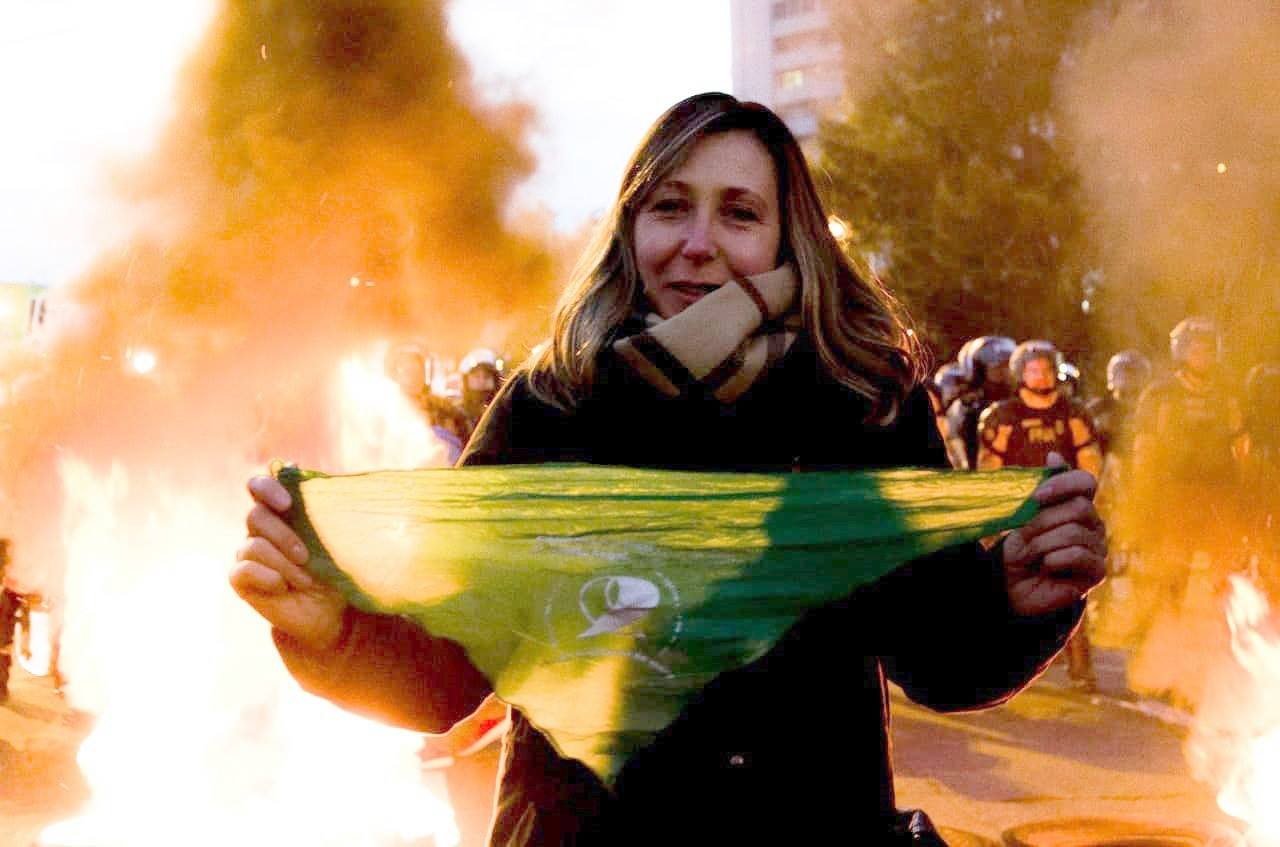
Myriam Bregman at a roadblock during a one day general strike in June, 2018.
During the debate in the National Congress, the church and the leaders of campaigns against the legalization of abortion (who are referred to as “anti-rights”) used bizarre, reactionary and moralistic rhetoric, and they organized two demonstrations with very low turnout. So the church resorted to their regular practices, such as threats against different legislators.
The anti-rights fundamentalists, who claim to “defend both lives,” threatened to kill some of the representatives’ children.
Sixty-five members of the Cambiemos bloc voted for women to keep having illegal abortions, bringing the government to the brink of a new crisis and exposing the fact that its approval of the debate on abortion was sheer, improvised opportunism to prevent a confrontation with the huge women’s movement that has been developing in Argentina. Most of the governing party hoped that the bill wouldn’t pass and that it would be rejected by a slim margin.
Even Pope Francis tried to convince several representatives by calling them from the Vatican. Many representatives of Cambiemos, the Peronists and other coalitions have close ties with the church.
Except for the Left Front, every bloc in Congress has a relationship with the Vatican.
LV: What needs to be done now to get the bill through the Senate? What obstacles will the women’s movement face? Where should the left go from here?
Myriam Bregman: The bill that just got passed in the lower house will have to go through the Senate, where there are several divisions in the political blocs. The upper house is a more direct representation of the governors and the most reactionary sectors that oppose legalization.
While politicians from different political parties in the lower house, Kirchnerists, Macristas, Peronists and The Radical Civic Union (known as “the Radicals”) embraced each other, trying to convince us that it was because of their unity that the bill passed the House, new generations of women have learned a fundamental lesson: without their struggle, none of this would’ve been achieved.
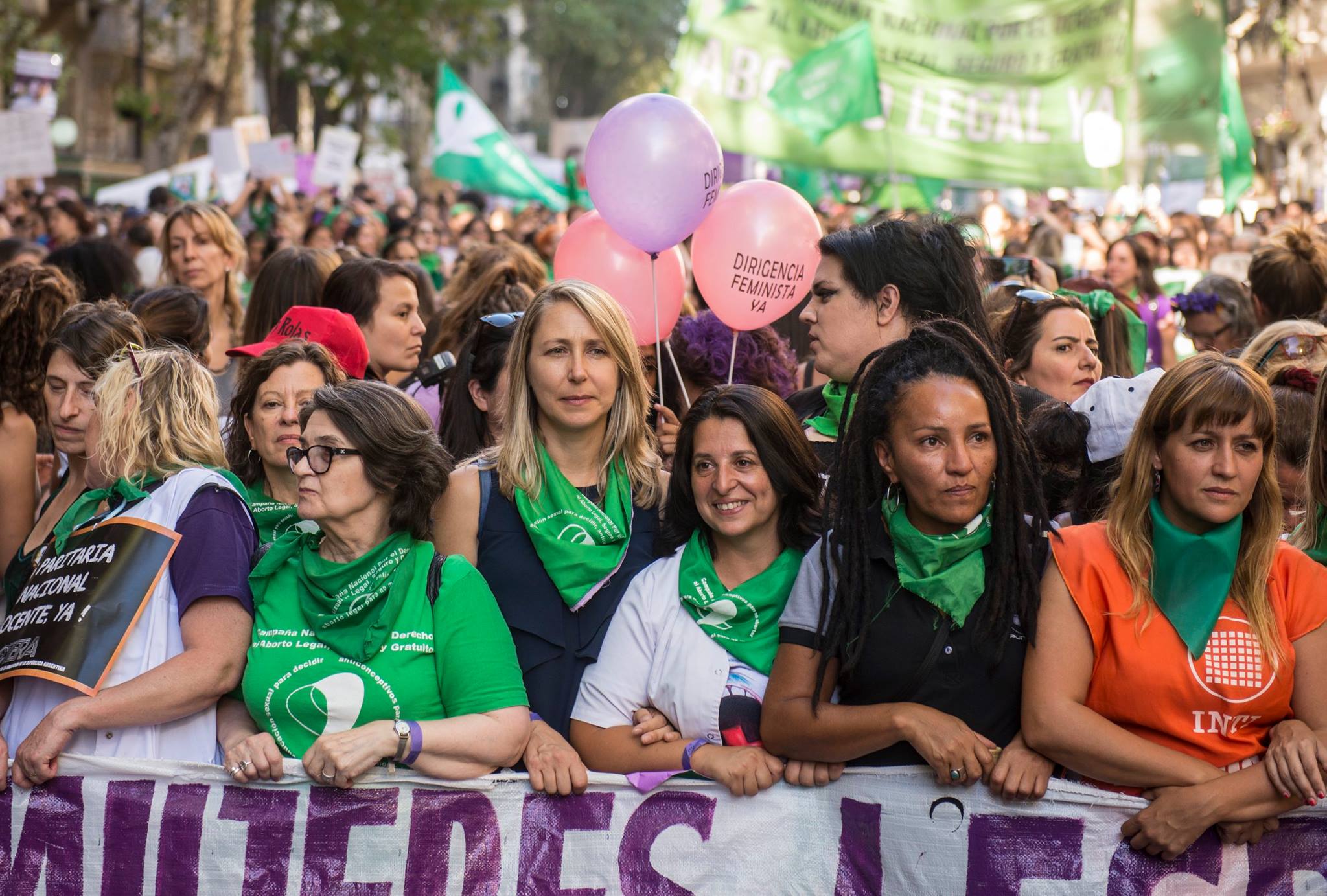
Myriam Bregman at a protest for free, safe and legal abortions.
Only the Left Front unanimously voted for what we have always fought for on the streets.
In the Senate, just as in the lower house, neither the Peronists, “the Radicals”, the Republican Proposal nor any other political coalition has a unified position. The senators blindly obey the provincial governors and the church.
The battle in the Senate will require even larger protests on the streets. We have to take advantage of this moment to expand and strengthen the organization of thousands of women in schools and universities, in neighborhoods and workplaces throughout the country.
#Aborto legal en el hospital! ¡Aborto legal para no morir! #argentina 💚 se vota en el Congreso, se gana en las calles! #abortolegalya
Posted by Cynthia Lub on Thursday, June 14, 2018
The crowd’s reaction at the moment that the bill passed.


